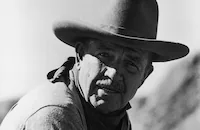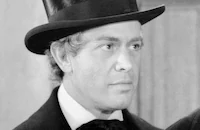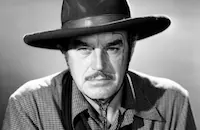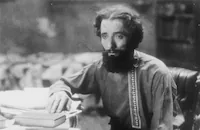Robin Hood of El Dorado

Brief Synopsis
Cast & Crew
William A. Wellman
Warner Baxter
Ann Loring
Bruce Cabot
Margo
J. Carrol Naish
Film Details
Technical Specs

Synopsis
In 1848, California is thought by many to be "El Dorado," the mythical land of overflowing riches. It is there that Mexican farmer Joaquin Murrieta lives. He is engaged to Juanita de la Cuesta, daughter of Ramon de la Cuesta, who owns the rancho on which he lives. When Captain Osborne, the governor's inspector, visits the spanish-speaking village, many of the residents distrust the Americano's motives. After an arrow is fired in Osborne's direction, narrowly missing him, Roman is angered by the deed and demands that the man who shot the arrow step forward. Joaquin bravely accepts the blame for the fired arrow when no one else will. As a result, Joaquin is banished from the village and forced to flee into the country. When gold is discovered at Sutter's Mill, the ensuing gold rush brings in many ruthless fortune hunters. One of the prospectors, Bill Warren, shoots a man named Tomas, who is immediately taken to Joaquin's mother for treatment. Following an attack on Joaquin by the white settlers, who want to force him off his land, Rosita is killed and Joaquin swears revenge upon the men who killed her. When Joaquin and his brother Jose kill one of the Americanos, a one thousand dollar reward is posted for Joaquin's capture. Meanwhile, Pete, an unscrupulous prospector, harasses Joaquin and falsely accuses Joaquin of riding a horse that belongs to him, and a fight ensues. Later, Joaquin kills Pete and tells his men to bear arms and join Three Fingered Jack's band of bandits. Joaquin's camp is set up at Hidden Valley, where a meeting is held to discuss the Americanos' take-over of California. In response to the Americanos' threat, Mexicans under Three Fingered Jack's leadership loot the Americanos and the rich Mexican "hacendados." Joaquin takes part in the raids, and during one such operation, is reuntied with Juanita, the hacienda señorita from de la Cuesta's rancho. Juanita, now a rich Mexican socialite, forgives Joaquin's banditry and joins him in fight against the plundering "gringos." When two Americanos are killed by Mexicans, a posse is organized to punish the Mexicans. Following a bungled stagecoach robbery by the bandits, in which the coach driver and a young bride-to-be are unintentionally murdered, Johnnie Warren, the young girl's fiancé, organizes a posse and goes to Hidden Valley to kill Joaquin. Meanwhile, at Joaquin's camp, Joaquin delivers an emotional speech in which he says that he can no longer be the bandits' leader in the wake of his complicity in the young girl's accidental death. Joaquin then bids the bandits farewell, but before he can flee to Mexico, the posse arrives and a shootout ensues. Three Fingered Jack is killed in the attack, and Joaquin, while attempting to escape, is shot and killed at Rosita's grave.

Director

William A. Wellman
Cast

Warner Baxter
Ann Loring

Bruce Cabot

Margo

J. Carrol Naish

Soledad Jimenez
Carlos De Valdez

Eric Linden

Edgar Kennedy
Charles Trowbridge

Harvey Stephens
Ralph Remley
George Regas
Francis Mcdonald
Kay Hughes
Paul Hurst
Boothe Howard

Harry Woods
G. Pat Collins
Harold Goodwin
Ivan "dusty" Miller
Tom Moore
Rychard Cramer
Carlotta Monti
Perez
Charles Stevens
J. P. Mcgowan
Nick De Ruiz
Lew Harvey
Ben Taggart
Cully Richards
Duke Green
Marc Lawrence
Frank Campeau
Robert Perry
Frank Yaconelli
Lee Shumway
Frank Hagney

Lee Phelps
George Macquarrie
Sam Ash
Inez Palange

Nigel De Brulier
Mathilde Comont
Lou Yaconelli
Crew
Tom Andre
H. O. Bombacher
Rowland Brown
Joseph Calleia
John W. Considine Jr.
Allan Garcia
Chester Hale
Robert J. Kern
Peter B. Kyne
Melvin Levy
Chester Lyons
James Kevin Mcguinness
John Thomas Neville
Howard Emmett Rogers
Gabriel Scognamillo
Douglas Shearer
Lynn Starling
Herbert Stothart
C. Gardner Sullivan
Dan Totheroh
David Townsend
Dolly Tree
William A. Wellman

Film Details
Technical Specs

Articles
Robin Hood of El Dorado
Producer: John W. Considine Jr.
Director: William A. Wellman
Screenplay: William A. Wellman, Joseph Calleia, Melvin Levy
Cinematography: Chester Lyons
Film Editing: Robert Kern
Art Direction: Gabriel Scognamillo, David Townsend
Music: Herbert Stothart
Cast: Warner Baxter (Joaquin Murrieta), Ann Loring (Juanita de la Cuesta), Bruce Cabot (Bill Warren), Marto (Rosa de Murrieta), J. Carrol Naish (Three Fingered Jack), Soledad Jimenez (Madre Murrieta).
BW-85m.

Robin Hood of El Dorado
Marc Lawrence (1910-2005)
Born Max Goldsmith on February 17, 1910, in the Bronx, Lawrence had his heart set on a career in drama right out of high school. He enrolled at City College of New York to study theatre, and in 1930, he worked under famed stage actress Eva Le Gallienne. Anxious for a career in movies, Lawrence moved to Hollywood in 1932 and found work immediately as a contract player with Warner Bros. (an ideal studio for the actor since they specialized in crime dramas). He was cast as a heavy in his first film, If I Had a Million (1932). Although his first few parts were uncredited, Lawrence's roles grew more prominent: a sinister henchman in the Paul Muni vehicle in Dr. Socrates (1935); a conniving convict aiding Pat O'Brien in San Quentin (1937); a menacing thug stalking Dorothy Lamour in Johnny Apollo (1940); the shrewdly observant chauffeur in Alan Ladd's breakthrough hit This Gun For Hire (1942); and one of his most memorable roles as Ziggy, a fedora wearing mobster in the Bogart-Bacall noir classic Key Largo (1948).
Lawrence, when given the opportunity, could play against type: as the prosecuting attorney challenging Tyrone Power in Brigham Young (1940); a noble aristocrat in the Greer Garson-Walter Pidgeon period opus Blossoms in the Dust; and most impressively, as a deaf mute simpleton in the rustic drama The Shepherd of the Hills (both 1941). Better still was Lawrence's skill at comedy, where his deadpan toughness worked terrifically as a straight man against the likes of Joe E. Brown in Beware Spooks (1939); Abbott and Costello in Hit the Ice (1943); Penny Singleton in Life with Blondie (1945); and Bob Hope in My Favorite Spy (1951).
After that, Lawrence's career took a turn downward spin when he was labeled a communist sympathizer during the Hollywood witch hunts of the early '50s. He was exiled in Europe for a spell (1951-59), and when he came back, the film industry turned a blind eye to him, but television overcompensated for that. Here he played effective villains (what else?) in a series of crime caper programs: Peter Gunn, Johnny Staccato, The Untouchables, Richard Diamond, Private Detective; and eventually made a welcome return to the big screen as a returning exiled gangster in William Asher's underrated mob thriller Johnny Cool (1963).
It wasn't long before Lawrence found himself back in the fray playing in some big box-office hits over the next two decades: Diamonds Are Forever (1971), The Man with the Golden Gun (1974), Marathon Man (1976), Foul Play (1978); and The Big Easy (1987). Sure he was cast as a gangster, but nobody could play a rough and tumble mob boss with more style or conviction.
Interestingly, one of his finest performances in recent years was in television, as a severely ill old man unwilling to accept his fate in a fourth season episode of ER (1997-98). His last screen role was just two years ago, as a nimble minded VP in Looney Tunes: Back in Action (2003).
In 1991, Lawrence published a memoir about his venerable career, Long Time No See: Confessions of a Hollywood Gangster that received much critical acclaim. He has also developed a cult following due to his appearances in such offbeat items as From Dusk to Dawn and Pigs aka Daddy's Deadly Darling, the 1972 horror film he directed and starred in with his daughter Toni. He is survived by his wife, Alicia; two children from a previous marriage, Toni and Michael; and a stepdaughter Marina.
by Michael T. Toole
Marc Lawrence (1910-2005)
Quotes
Trivia
Notes
Working titles for this film were Born to Die, I Am Joaquin, In Old California and Murietta. The film is loosely based on the life of legendary Mexican bandit Joaquin Murieta. For more information on Murieta, see the entry above for The Avenger, which was also about him. A January 1936 Hollywood Reporter news item noted that although this picture was nearly completed in late August 1935, M-G-M held up its release in order to "get the full effect of the serialization of the story." The novelization of the film was written by Peter B. Kyne and appeared serially in 130 newspapers throughout the country. The studio set an April 1936 release date; however, a March 1936 Hollywood Reporter article stated that M-G-M decided to rush the release of the picture due to a temporary shortage of M-G-M pictures ready for release in the New York area. The article also indicates that the studio planned to "roadshow" the film in Boston and Miami Beach one week after the New York showing. The Miami Beach booking was reportedly designed to "grab off business" before the end of the Florida tourist season. According to an April 1936 Hollywood Reporter news item, the release of the picture in England was held up due to objections raised by the British censor board to three aspects of the film: scenes showing horses falling; the depiction of a man being shot to death following a fighting scene; and references to the slicing off a Chinese man's ears. The British release was postponed until M-G-M completed protection shots for those scenes. A Hollywood Reporter pre-production news item stated that actor Leo Carrillo was to star in this film, and that Raoul Walsh was sought to direct. Subsequent Hollywood Reporter news items noted that Joseph Calliea, who was originally signed to play "Three Fingered Jack," was moved to the starring role. Calliea was later pulled from the lead because the studio decided he was too old to play the part of a man who died at the age of twenty-three. Ironically, his replacement, Warner Baxter, was forty-four at the time of the production, six years older than Calleia. Hollywood Reporter pre-production news items also noted that actress Margo replaced Jean Parker as "Juanita," and was later shifted to the role of "Rosita" after a young Brooklyn College student named Anita Kurtin won a Hollywood screen test and the starring role in the film. Following Kurtin's assignment to the part, her name was changed to Ann Loring. In addition, Hollywood Reporter notes that William Henry was originally set to play "Johnny Warren," and Bradley Page was set for the part of "Slocum." Hollywood Reporter news items list actors Lucio Villegas, Elizabeth Wilbur, George Chandler and Gayne Whitman in the cast, but their appearance in the released film has not been confirmed. According to Hollywood Reporter, one month prior to the start of production, M-G-M sent a troupe of twenty-seven carpenters, painters and art directors to Sonoma County, California, to reconstruct several old mining camps, including the local landmarks Angels Camp and Sawmill Flats. Hollywood Reporter news items also relate the following information: Chester Hale prepared the bandit dance number, featuring Carlotta Monti and Perez. (Perez's first name has not been determined). H. O. Bombacher, one of the oldest residents of the ghost town of Springfield, California, was hired as a technical adviser on the picture. Director William Wellman planned to use three hundred cowboys in the film. Warner Baxter suffered from a "nervous strain" which was attributed to having to wear a noisy pair of forged iron spurs for twelve weeks. The actor was advised by his physician to recover in the quiet of his home.















